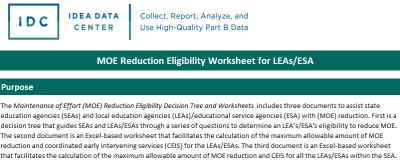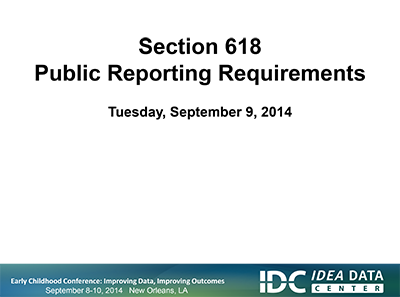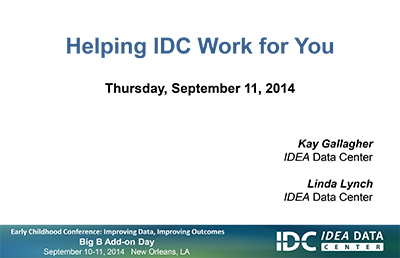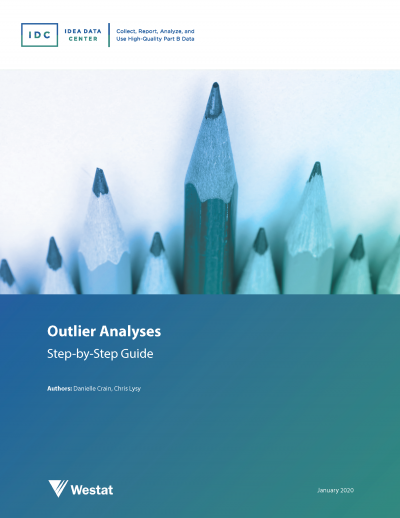Site Search
Results 15 - 21 of 29
Format: Applications and Spreadsheets
Maintenance of Effort (MOE) Reduction Eligibility Decision TreeThe Maintenance of Effort (MOE) Reduction Eligibility Decision Tree guides SEAs and LEAs/ESAs through a series of questions to determine an LEA’s/ESA's eligibility to reduce MOE.
Format: Applications and Spreadsheets
Maintenance of Effort (MOE) Reduction Eligibility WorksheetsThe Maintenance of Effort (MOE) Reduction Eligibility Worksheets includes two documents to assist SEAs and LEAs/ESAs with MOE reduction. The first is an Excel-based worksheet that facilitates the calculation of the maximum allowable amount of MOE reduction and CEIS for the LEA/ESAs. The second document is an Excel-based worksheet that facilitates the calculation of the maximum allowable amount of MOE reduction and CEIS for all the LEAs/ESAs within the SEA.
Format: Applications and Spreadsheets
EDFacts IDEA Discipline Data InfographicThe EDFacts IDEA Discipline Data Infographic provides basic information about the EDFacts file specifications states use to submit IDEA Discipline data to the U.S. Department of Education. The infographic outlines details about Discipline data for children and youth with disabilities ages 3 through 21 that states must include in their annual submission of EDFacts files FS005, FS006, FS007, FS088, FS143, and FS144.
Format: Presentations
Public Reporting of Section 618 Data: Regulations, Processes, and PitfallsIDEA requires that states publicly report Section 618 data. To assist SEA special education directors and data managers in meeting these requirements, IDC is developing a TA tool to simplify regulatory language and requirements into one document that includes process tips and pitfalls. The presentation highlighted existing practice across the country and provided opportunity for attendees to review the current draft of the proposed TA tool.
Format: Presentations
Helping IDC Work for YouIDC's Communication and Dissemination team presented an interactive overview of strategies IDC uses to engage stakeholders in learning about issues related to high-quality IDEA data. The team discussed IDC's website for public access to information about tools and products and TA resources, access to IDC's learning communities for registered users, communicating through IDC's Part B and Part C listserves, and networking through social media.
Format: Applications and Spreadsheets
IDEA Data Quality: Outlier Analyses ToolsIDC designed these two technical assistance products to be used by state personnel responsible for IDEA 618 and/or 616 data. The products include a step-by-step guide on completing an outlier analysis, with a brief introduction on the principles of outlier analyses, and a tool state staff can use to conduct outlier analyses with their local data. IDEA Part B state staff working with LEAs also can use both products to analyze their local data.
Format: Presentations
Moving Data Quality Downstream - Building a Culture of Data Quality at the LEA LevelPresenters and participants discussed strategies that SEAs can use to help LEAs in collecting section 618 and other state-required data that is of high-quality. They explored IDC’s Knowledge Lab that lists various resources around different data collections. The Knowledge Lab contains many resources designed to help SEAs and LEAs gather, collect, validate, and report high-quality data. The discussion allowed for state input on how the state uses or can use these resources.








